
black snakeroot, bugbane, bugwort, rattleroot, rattletop, rattleweed, and macrotys.
Black cohosh (Actaea racemosa , Cimicifuga racemosa), a member of the buttercup family, is a herbaceous perennial plant that is native to North America. Black cohosh is a traditional herbal medicine used for rheumatism, arthritis, muscle pain and nervous disorders. Contemporary health benefits from Black cohosh use include treatment for premenstrual tensions, symptoms of menopause such as hot flashes and night sweat, and other gynecological problems in women.
Black cohosh is an erect perennial plant that grows from underground rhizome (stems) up to 2 meters height. Black cohosh has large compound leaves up to 1 meter in length that has 2 to 5 leaflets that are arranged in three repeated leaflets. Black cohosh leaves are green that has serrated margins. Black cohosh produces flowers from a tall arching stalk during the months of June to September. The flower is composed of tightly clustered greenish-white stamens surrounding a white stigma. Black cohosh flower has a distinct sweet smell that attracts insects. Black cohosh bear fruits that are dry about 10 mm long with one carpel containing seeds.
Black cohosh contains variety of chemicals that has found its value in traditional Indian medicine, although limited medical and scientific research may supprot its claims.
 Black cohosh Traditional Health Benefits
Black cohosh Traditional Health Benefits
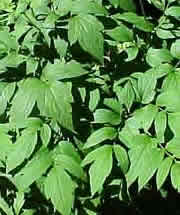 Black cohosh is now being used to help manage some symptoms of premenstrual tensions, menopause and other gynecological problems in women.
Black cohosh is now being used to help manage some symptoms of premenstrual tensions, menopause and other gynecological problems in women.
Black cohosh is used to treat the following symptoms of menopause:
Black cohosh is also used as an alternative to hormone replacement therapy.
Pharmacological effects of Cimicifuga racemosa.
Cimicifuga racemosa is widely employed to relieve menopause symptoms for its hormonal-like action. However, recent experimental studies have not found an estrogenic action by this plant. The purpose of this systematic review is to analyse all experimental studies (in vivo and in vitro) performed on C. racemosa to elucidate its mechanism of action. Animal and in vitro experiments on C. racemosa were identified through a computerised literature searches performed on Medline (PubMed), Embase, Amed, CISCOM and Cochrane Library databases. In addition, bibliographies of the articles thus located were scanned for further relevant publications and manufactures of commercial C. racemosa preparations were asked to contribute published and unpublished material. No language restrictions were imposed. A total of 15 animal and 15 in vitro studies on C. racemosa have been found. Their results suggest that C. racemosa possesses a central activity instead of a hormonal effect. Further biological and chemical investigations are required to define its mechanism of action and to identify the compounds responsible of its actions. Source: Life Sci. 2003 Jul 25;73(10):1215-29.
Efficacy of a standardized isopropanolic black cohosh (Actaea racemosa) extract in treatment of uterine fibroids in comparison with tibolone among patients with menopausal symptoms.
Both therapies demonstrated efficacy in relieving menopausal symptoms; however, isopropanolic black cohosh (Remifemin) seems to be a more appropriate choice in alleviating menopausal symptoms in women with uterine fibroid. Isopropanolic black cohosh seems to be a valid treatment option in patients with uterine fibroids, as it provides adequate relief from menopausal symptoms and avoids increase in uterine fibroid size, which is usually a cause of concern for the patient Source: Holist Nurs Pract. 2014 Nov-Dec;28(6):386-91.
A cycloartane glycoside derived from Actaea racemosa L. modulates GABAA receptors and induces pronounced sedation in mice.
In the present study, we analyzed a potential subunit-selective modulation of GABA-induced chloride currents (IGABA) at GABA concentrations eliciting 3-8% of the maximal GABA response (EC3-8) through nine GABAA receptor isoforms expressed in Xenopus laevis oocytes by Ac-SM with two-microelectrode voltage clamp and behavioral effects 30 minutes after intraperitoneal application in a mouse model. In mice, Ac-SM significantly reduced anxiety-related behavior in the elevated plus maze test at a dose of 0.6 mg/kg, total ambulation in the open field test at doses ≥6 mg/kg, stress-induced hyperthermia at doses ≥0.6 mg/kg, and significantly elevated seizure threshold at doses ≥20 mg/kg body weight. High efficacy and long biologic half-life of Ac-SM suggest that potential cumulative sedative side effects upon repetitive intake of A. racemosa L. preparations might not be negligible. Source: J Pharmacol Exp Ther. 2014 Nov;351(2):234-42.
Efficacy and safety of Black cohosh (Actaea/Cimicifuga racemosa) in the treatment of vasomotor symptoms--review of clinical trials.
The following paper reviews professional literature about Black Cohosh (Actaea/Cimicifuga racemosa), either used alone or in combination with other medicinal herbs administered in management of vasomotor symptoms. Extracts of the rootstock of Black cohosh contain such potentially biologically active constituents as triterpene glycosides (actein, cimicifugoside, deoxyacetein), isoferulic acid and alkaloids (n-methylcytisine). The mechanism of its action remains unclear. Some authors suggest that Black Cohosh contains substances with selective estrogen receptor modulator (SERM) activity. Recent data has demonstrated that Black Cohosh may have an effect on dopaminergic and serotoninergic systems. Thirty-two papers formed the basis for this review. Open-label, noncomparative studies, as well as treatment-controlled, randomized, open trials, have proven that Black Cohosh significantly reduced frequency or severity of hot flashes. The results of randomized, placebo-controlled, double-blind clinical trials were contradictory. Adverse symptoms have been rare (5,4%), mild and reversible. Most of them included gastrointestinal upsets, rashes, headaches, dizziness and mastalgia. Source: Ginekol Pol. 2008 Apr;79(4):287-96.
Inhibition of inducible nitric oxide synthesis by Cimicifuga racemosa (Actaea racemosa, black cohosh) extracts in LPS-stimulated RAW 264.7 macrophages.
Cimicifuga racemosa (Actaea racemosa, black cohosh) is used as an anti-inflammatory, antipyretic and analgesic remedy in traditional medicines. The present study focuses on the effects of C. racemosa root extracts on inducible nitric oxide synthase (iNOS) in lipopolysaccharide-stimulated murine macrophages (RAW 264.7). Results showed that incubation of lipopolysaccharide-stimulated macrophages with aqueous C. racemosa extracts (0-6 mg/ml) inhibited nitrite accumulation in a concentration-dependent manner. Incubation with the extract was associated with a concentration-dependent reduction of interferon beta and interferon regulatory factor 1 mRNA. Among the triterpene glycosides, 23-epi-26-deoxyactein was identified as an active principle in C. racemosa extracts. Extracts from the roots of C. racemosa inhibit nitric oxide production by reducing iNOS expression without affecting activity of the enzyme. This might contribute to the anti-inflammatory activities of C. racemosa. Source: J Pharm Pharmacol. 2009 Aug;61(8):1089-96.
Black cohosh plant is widely cultivated and can be sourced through local horticulturist. Black cohosh roots and rhizomes (underground stems) can be harvested from fields.
Black cohosh is also commercially prepared in powder, tincture and capsules taken as supplements. They are available in most fitness and health stores. Black cohosh is also available online via Amazon as listed: Nature's Way Black Cohosh Root for example, there are other brands, be sure to select one from a reputable manufacturer and do follow the suggested dosage.
The usual daily dosage is 40 milligrams, but because the strength of commercial preparations may vary, be sure to follow the manufacturer's instructions whenever available.
The dried root and rhizomes are used to make tea. Boil for 10 - 15 minutes and let it steep. Take 1 to 2 cups per day.
You can add other herbs or honey to improve the efficacy and taste. Not to be taken continously for more than 1 year (see side effects).
Black cohosh is generally safe for most adults. Just like any other herbal medicines, abuse of use may cause adverse reactions and poisoning, moderation in use is recommended.
Side effect of overdose, include head ache, nausea, dizziness, abdominal pain, nervous system and visual disturbances, reduced pulse rate, rash and increased perspiration.
Black cohosh may cause liver disorder. In rare cases, women who are taking black cohosh reported liver disorder. It is not clear if black cohosh is responsible but the United States Pharmacopeia suggest that if symptoms such as abdominal pain, jaundice or dark urine is noted, use of black cohosh should be discontinued and the woman is adviced to seek medical attention.
Breast cancer: Some reports suggests that Black cohosh may worsen existing breast cancer. Women who have breast cancer, those who had breast cancer or those who are at risk for breast cancer is advised to avoid Black cohosh herbal medicine.
Hormone-sensitive conditions, including fibroids, endometriosis, ovarian cancer, uterine cancer, breast cancer and others: Black cohosh has estrogen like activity to the body. Black cohosh may worsen conditions that are sensitive to female hormones. Women who are with conditons as that is affected by the female hormones are advised to avoid Black cohosh.
Black cohosh herbal extract is not to be given to children without professional medical supervision.
Use of Black cohosh herbal extract is also discourage during pregnancy and lactation.
Black cohosh is not advisable for prolonged use due to potential risk of liver damage or poisoning. Medical supervision is adviced.
Black cohosh is a potent herbal medicine and the full extent of its interaction with drugs and other herbal medicines is undetermined. Black cohosh should not be taken simultaneously with the drugs that affects the female hormone and the liver without medical supervision.
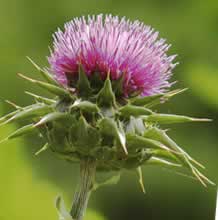 Silymarin extract still tops in liver protection
Silymarin extract still tops in liver protection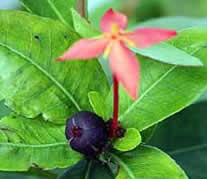 Santan Flower has wound healing properties
Santan Flower has wound healing properties 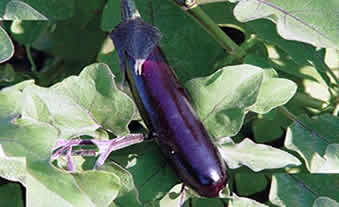 Antioxidant properties from Talong
Antioxidant properties from Talong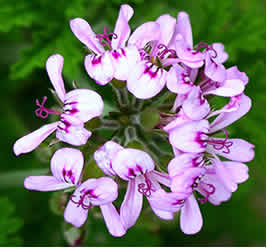 Malvarosa Plant found to have antioxidant properties
Malvarosa Plant found to have antioxidant properties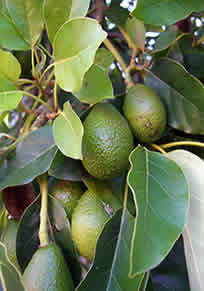 Anti-cancer properties of Avocado fruit
Anti-cancer properties of Avocado fruit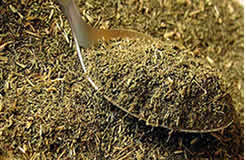 Stevia use can cause cancer, studies suggests
Stevia use can cause cancer, studies suggests